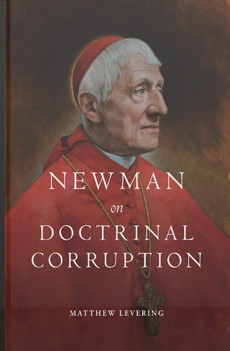Levering’s book explores Newman’s concerns on doctrinal corruption

Reviewed by Dr. Matthew Vander Vennet
Word on Fire Academic has recently published a work on St. John Henry Newman by the inimitable Dr. Matthew Levering titled “Newman on Doctrinal Corruption.” Newman has many claims to fame, but chief among those claims lies his thoughts on the development of Christian doctrine over the centuries. In fact, he wrote a book with the title “An Essay on the Development of Christian Doctrine” (a must read).
What Levering attempts to undertake in his monograph is a look at Newman’s perspective and concerns on doctrinal corruption. Of course, this makes total sense. If Newman had thoughts on doctrinal development, then he certainly would have thoughts on doctrinal corruption. This work attempts to offer a perspective on those thoughts.
If the goal of Dr. Levering’s work was to show St. John Henry Newman and his reflections on doctrinal corruption and development throughout his life, then the work succeeds. It is a welcome addition to the continuing Newmanian studies currently underway.
For Newman, history is not some collection of happenings and events that occurred in the past which subsequently influenced humanity. Newman believed that God was operative in those events, divinely stamping human history. Thus, as Levering states, “Newman’s theology of history plays a central role.” (6)
The Church exists in time and therefore must constantly present the truths of the Gospel and Jesus Christ to the world, ever coming to a deeper understanding of the deposit of faith. Returning to the sources of Scripture and tradition guarantees the indefectibility of the Church and her teaching. Newman was highly concerned with this matter throughout his life as both an Anglican and finally as a cardinal of the Catholic Church. In communicating divine revelation, he believed firmly that God was ultimately in charge.
DIVINE DEVELOPMENTS
Levering divides his work into five chapters. Selections from the works from each of the authors mentioned above are treated first within a given chapter and then followed by responses from Newman to the charges of the particular author. Some authors ante-date Newman in time, while the rest are contemporaneous and even related to him. By chronologically presenting the authors and Newman’s responses to their charges, the book allows the reader to witness the progression of Newman’s thoughts on the idea of doctrinal corruption throughout his life and as the discussion progressed throughout the 19th century. Levering shows “that concerns about doctrinal corruption stand at the heart of a great deal of Newman’s work.” (22)
Particularly intriguing was Newman’s responses to the controversies surrounding the dogmatic definitions of the Immaculate Conception and papal infallibility, both done after he came into the Church. Levering was wise to include these responses as it gave an example of real time considerations on the part of Newman in explaining what is a doctrinal development versus a doctrinal corruption. His defense of the Church’s prerogatives in these matters are instructive for those wishing to defend other perceived “doctrinal corruptions” even in our own time.
There is a constant refrain of getting back to the sources and imitating what the early Church did, as if simply going back to a “purer” time would solve the perceived ills or issues within and without the Church. While it is a nice thought, to ignore the 20 centuries of lived reality would be a tremendous mistake. The doctrinal development and the efflorescence in matters of explanation are organic and, as Newman would say, divine developments in time. The guidance of the Holy Spirit must come into account in the discussion as He guides the Church evermore into its understanding of the Truth, who is Jesus Christ.
If the goal of Dr. Levering’s work was to show St. John Henry Newman and his reflections on doctrinal corruption and development throughout his life, then the work succeeds. It is a welcome addition to the continuing Newmanian studies currently underway.
—
 DR. MATTHEW VANDER VENNET is director of advancement at The High School of Saint Thomas More in Champaign. He earned his doctorate in Church History from The Catholic University of America and is a member of The Catholic Post’s book review team.
DR. MATTHEW VANDER VENNET is director of advancement at The High School of Saint Thomas More in Champaign. He earned his doctorate in Church History from The Catholic University of America and is a member of The Catholic Post’s book review team.





